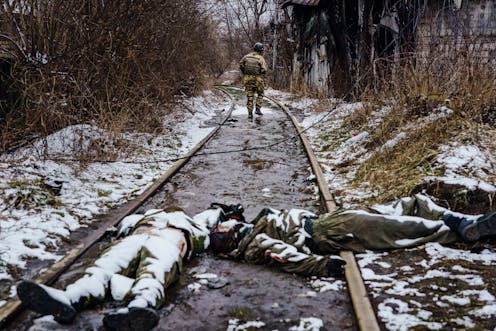How fairy tales shape fighting spirit: Ukraine's children hear bedtime stories of underdog heroes, while Russian children hear tales of magical success
- Written by Mia Bloom, Professor and Fellow at Evidence Based Cyber Security Program, Georgia State University

At the outset of Russia’s invasion, almost no one in the West expected that Ukraine would be able to offer Russia any kind of serious opposition[1] to its unprovoked aggression.
Much has been written about how leaders, including allies, underestimated the leadership ability of Volodymyr Zelenskyy. But beyond miscalculating how a comedian could transform into a Winston Churchill-like figure[2], military assessments of the Ukrainian army[3] were also way off[4].
Several weeks into the war, it’s clear many overestimated the Russian army’s will and capability to fight[5] and the Ukrainian army’s will to resist an opponent superior in number, equipment and positioning[6].
What can explain the way the Ukraine war has played out, in contradiction to experts’ predictions?
We believe that one factor underlying the unexpected performance of each country’s military can be traced to the cultural differences between Russians and Ukrainians. Those differences were cultivated in part through the fairy tales of their childhoods.
One of us, Sophia Moskalenko, is an expert on the psychology of fairy tales[7]. The other, Mia Bloom, studies children’s mobilization into violent extremism[8] – why and how children turn to violence. We know the power of folklore in shaping the worldview of children and, ultimately, of the adults they grow up to be.
Underdog hero vs. magical thinking
Folklore is important for understanding people’s cultural narratives – story lines that describe something unique to the culture’s history and its people. They help to define a cultural identity and, in subtle ways, shape future choices[9]. The master narratives that Ukrainian children grow up with – which serve as the dominant cultural script – are radically different from the ones Russian children absorb.
Traditional Ukrainian bedtime stories, such as “Kotygoroshko[10],” “Kyrylo Kozhumyaka[11]” and “Ivasyk Telesyk[12],” all portray unassuming characters persevering against insurmountable odds. The character arc takes them through challenges, testing their will and transforming them from vulnerable to triumphant.
These fairy tales follow a well-known narrative arc of the underdog hero – a formula used for decades in bestselling books like “Harry Potter[15]” and Hollywood blockbusters like “Star Wars[16].”
In Ukrainian children’s bedtime stories, the main characters often start out as unlikely heroes, but their courage, cleverness and grit help them succeed against the odds.
In contrast, Russian children’s stories often[17] revolve around a central character named Ivan Durak[18] – Ivan the Stupid[19]. He’s the third brother, inferior to his older brothers, one of whom is typically smart, the other average. When the main character is not explicitly called “stupid” he is portrayed as lazy, lounging in bed all day[20] while his older brothers work hard[21].
In Russian fairy tales such as “By the Pike’s Wish[23],” “Princess Frog[24]” and “Sivka Burka[25],” the main character eventually prevails. He doesn’t win through his own virtues, though, but through the intervention of a magical being – a fish, a frog, a horse – that does all the hard work while the main character claims credit.
These Russian folk tales seem to suggest that the recipe for success is not to be too smart or work too hard, like the two older brothers, but to sit tight in hope that magic will take care of everything.
Facing the greatest challenge
Most adults don’t walk around thinking about the fairy tales they heard as children. However, these early stories, experienced through the magnifying glass of childhood emotions, shape our understanding about the world[26]. They determine the repertoire of our actions, especially in times of crisis[27].
Fairy tales prepare us to recognize real-life heroes and villains, love and betrayal, good and evil. They guide our actions as we navigate these dichotomies[28].
The difference in traditional Russian and Ukrainian folklore might in part explain the difference between the Russian and Ukrainian armies’ performances.
When facing the greatest challenge of their lifetimes, those in the Russian army failed to perform well and demonstrated poor morale[29]. By contrast, Ukrainians rose to the challenge in a spectacular way[30], transforming themselves through grit and determination from the underdog to the hero who just might succeed against all odds.
[Get the best of The Conversation, every weekend. Sign up for our weekly newsletter[31].]
References
- ^ Ukraine would be able to offer Russia any kind of serious opposition (www.cnbc.com)
- ^ Winston Churchill-like figure (theweek.com)
- ^ military assessments of the Ukrainian army (apnews.com)
- ^ way off (www.rferl.org)
- ^ capability to fight (www.csis.org)
- ^ will to resist an opponent superior in number, equipment and positioning (thehill.com)
- ^ psychology of fairy tales (doi.org)
- ^ children’s mobilization into violent extremism (www.cornellpress.cornell.edu)
- ^ in subtle ways, shape future choices (doi.org)
- ^ Kotygoroshko (%D0%BA%D0%B0%D0%B7%D0%BA%D0%B0.%D1%83%D0%BA%D1%80)
- ^ Kyrylo Kozhumyaka (kazky.org.ua)
- ^ Ivasyk Telesyk (%D0%BA%D0%B0%D0%B7%D0%BA%D0%B0.%D1%83%D0%BA%D1%80)
- ^ thisisbossie/Flickr (www.flickr.com)
- ^ CC BY-SA (creativecommons.org)
- ^ Harry Potter (clarionherald.org)
- ^ Star Wars (epicheroism.wordpress.com)
- ^ Russian children’s stories often (ls.pushkininstitute.ru)
- ^ a central character named Ivan Durak (ec-dejavu.ru)
- ^ Ivan the Stupid (nukadeti.ru)
- ^ lounging in bed all day (nukadeti.ru)
- ^ while his older brothers work hard (openlibrary.org)
- ^ В. Курдюмов (commons.wikimedia.org)
- ^ By the Pike’s Wish (stpetersburg-guide.com)
- ^ Princess Frog (www.russianamericancompany.com)
- ^ Sivka Burka (www.russianamericancompany.com)
- ^ shape our understanding about the world (www.penguinrandomhouse.com)
- ^ times of crisis (doi.org)
- ^ They guide our actions as we navigate these dichotomies (doi.org)
- ^ those in the Russian army failed to perform well and demonstrated poor morale (www.politico.com)
- ^ Ukrainians rose to the challenge in a spectacular way (www.atlanticcouncil.org)
- ^ Sign up for our weekly newsletter (memberservices.theconversation.com)
Authors: Mia Bloom, Professor and Fellow at Evidence Based Cyber Security Program, Georgia State University

